
Julian Tuwim, known also under the pseudonym Oldlen as a lyricist, was a Polish poet, born in Łódź, then part of the Russian Partition. He was educated in Łódź and in Warsaw where he studied law and philosophy at Warsaw University. After Poland's return to independence in 1918, Tuwim co-founded the Skamander group of experimental poets with Antoni Słonimski and Jarosław Iwaszkiewicz. He was a major figure in Polish literature, admired also for his contribution to children's literature. He was a recipient of the prestigious Golden Laurel of the Polish Academy of Literature in 1935.

The Polish Workers' Party was a communist party in Poland from 1942 to 1948. It was founded as a reconstitution of the Communist Party of Poland (KPP) and merged with the Polish Socialist Party (PPS) in 1948 to form the Polish United Workers' Party (PZPR). From the end of World War II the PPR led Poland, with the Soviet Union exercising moderate influence. During the PPR years, the centers of opposition activity were largely diminished, and a socialist system was established in the country.
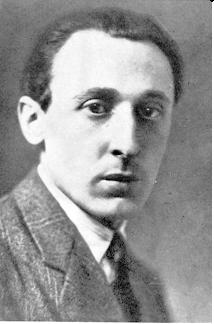
Bruno Jasieńskipronounced[ˈbrunɔjaˈɕeɲskʲi], born Wiktor Bruno Zysman, was a Polish poet, novelist, playwright, Catastrophist, and leader of the Polish Futurist movement in the interwar period. Jasieński was also a communist activist in Poland, France and the Soviet Union, where he was executed during the Great Purge. He is acclaimed by members of the various modernist art groups as their patron. An annual literary festival Brunonalia is held in Klimontów, Poland, his birthplace, where one of the streets is also named after him.

Leopold Henryk Staff was a Polish poet; an artist of European modernism twice granted the Degree of Doctor honoris causa by universities in Warsaw and in Kraków. He was also nominated for the Nobel Prize in Literature by Polish PEN Club. Representative of classicism and symbolism in the poetry of Young Poland, he was an author of many philosophical poems influenced by the philosophy of Friedrich Nietzsche, the ideas of Franciscan order as well as paradoxes of Christianity.
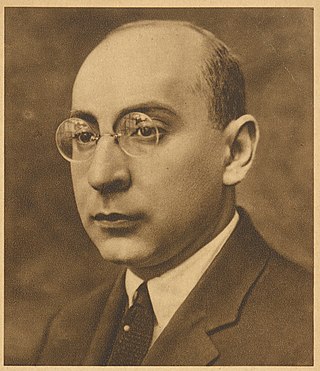
Antoni Słonimski was a Polish poet, artist, journalist, playwright and prose writer, president of the Union of Polish Writers in 1956–1959 during the Polish October, known for his devotion to social justice.

Stanisław Jerzy Lec, born Baron Stanisław Jerzy de Tusch-Letz, was a Polish aphorist and poet. Often mentioned among the greatest writers of post-war Poland, he was one of the most influential aphorists of the 20th century, known for lyric poetry and skeptical philosophical-moral aphorisms, often with a political subtext.
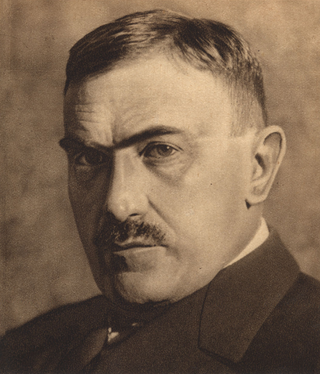
Tadeusz Kamil Marcjan Żeleński, better known by his pen name Tadeusz Boy-Żeleński or simply as Boy, was a Polish stage writer, poet, critic and, above all, the translator of over 100 French literary classics into Polish. He was a pediatrician and gynecologist by profession.

Adam Ważyk born Ajzyk Wagman was a Polish poet, essayist and writer born to a Jewish family in Warsaw. In his early career, he was associated with the Kraków avant-garde led by Tadeusz Peiper who published Zwrotnica monthly. Ważyk wrote several collections of poetry in the interwar years. His work during this period focused largely on the losses of World War I.

A partisan is a member of a domestic irregular military force formed to oppose control of an area by a foreign power or by an army of occupation by some kind of insurgent activity.

In Poland, the resistance movement during World War II was led by the Home Army. The Polish resistance is notable among others for disrupting German supply lines to the Eastern Front, and providing intelligence reports to the British intelligence agencies. It was a part of the Polish Underground State.

Anatol Stern was a Polish poet, writer and art critic. Born 24 October 1899 to an assimilated family of Jewish ancestry, Stern studied at the Polish Studies Faculty of the University of Wilno but did not graduate. Prominent among Polish futurist poets, between 1921 and 1923 he co-authored the "Nowa Sztuka" monthly. He also collaborated with other notable art magazines of the time, including the Skamander, Tadeusz Peiper's Zwrotnica and Wiadomości literackie.

Aleksander Wat was the pen name of Aleksander Chwat, a Polish poet, writer, art theoretician, memorist, and one of the precursors of the Polish futurism movement in the early 1920s, considered to be one of the more important Polish writers of the mid 20th century. In 1959, he emigrated to France and in 1963 relocated to the United States, where he worked at the Center for Slavic and East European Studies of the University of California, Berkeley.
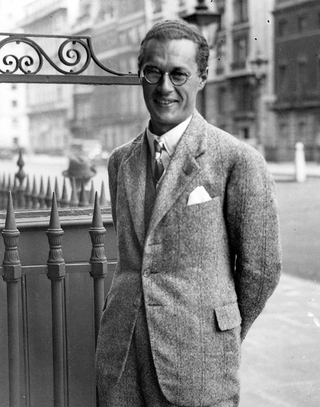
Kazimierz Wierzyński was a Polish poet and journalist; an elected member of the prestigious Polish Academy of Literature in the Second Polish Republic.

Józef Daniel Garbień was a Polish football striker who played for both Pogoń Lwów and the national team. He was part of the legendary Pogoń forwards, who in the early 1920s were superior to all opponents in the country.

Jerzy Jan Lerski ; was a Polish lawyer, soldier, historian, political scientist and politician. After World War II he emigrated to the United States, where he became a full professor at the University of San Francisco.

Tadeusz Stefan Gajcy alias Karol Topornicki”, „Roman Oścień”, „Topór”, „Orczyk“ , was a Polish poet, playwright, editor-in-chief of the Sztuka i Naród periodical, member of the Confederation of the Nation, soldier of the Home Army.
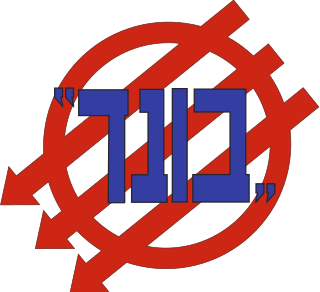
The General Jewish Labour Bund in Poland was a Jewish socialist party in Poland which promoted the political, cultural and social autonomy of Jewish workers, sought to combat antisemitism and was generally opposed to Zionism.
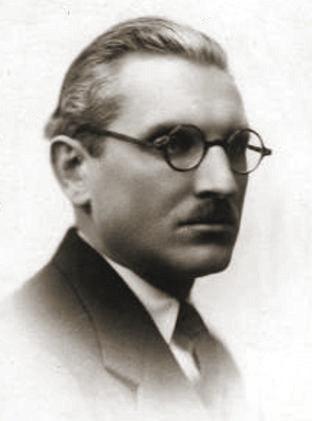
Adam Doboszyński was a soldier of the Polish Army, writer, engineer, and a social activist. Born in 1904 in Kraków, he was murdered by the Communist secret services in 1949, in the notorious Mokotów Prison in Warsaw.

Juliusz Hibner was a brigadier general in the Polish People's Army and recipient of the title of Hero of Soviet Union. He also served as the commander of the Internal Security Corps and later became a nuclear physicist.
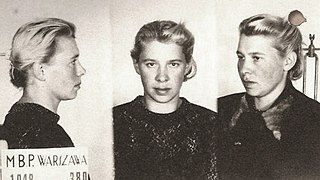
Lidia Lwow-Eberle nom de guerre "Ewa" was a Russian born Polish nationalist and paramedic. She was arrested by the communist authorities and she was imprisoned "for life". She later married and became an archaeologist.





















